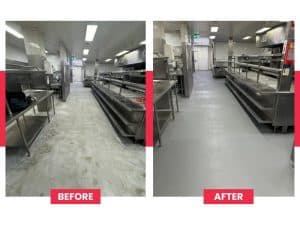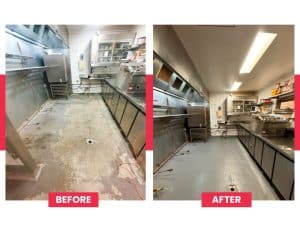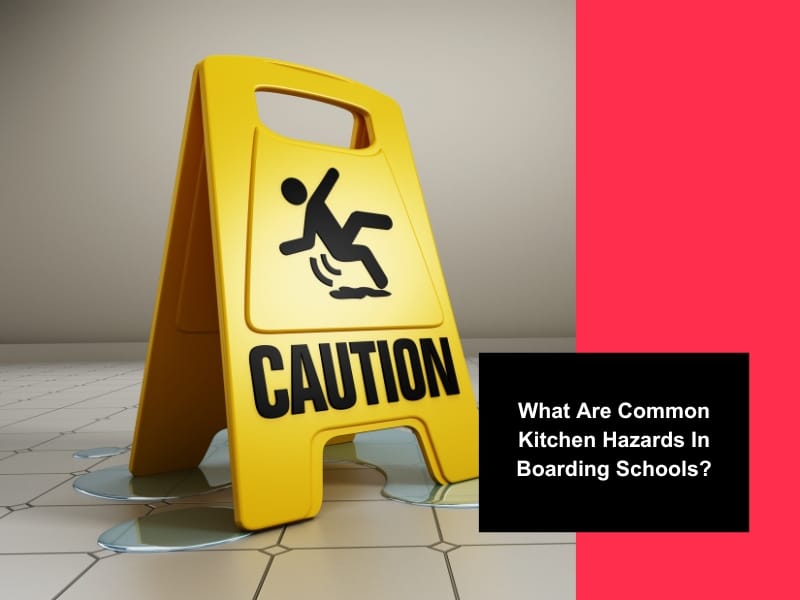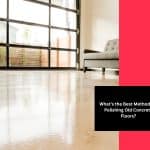Kitchens in boarding schools are bustling spaces that often serve meals to large groups of students and staff. While these kitchens are essential to daily life, they also have their own set of hazards. Ensuring safety is a priority, and proper flooring solutions are an effective way to address many of these hazards. This article will explore common kitchen hazards in boarding schools and how a professional flooring solution can help mitigate these risks.
What are the typical kitchen hazards found in boarding schools?
The kitchen is a high-risk environment, especially in boarding schools where the volume of activity can be overwhelming. Here are some of the most common hazards:
- Slips, trips, and falls: Wet floors are a significant risk, especially in areas where food and liquids are constantly being handled.
- Hot surfaces and equipment: With stoves, ovens, and grills in constant use, burns and scalds are common injuries in kitchens.
- Sharp objects and knives: The use of knives and other sharp objects can lead to cuts and lacerations.
- Heavy equipment: Lifting and moving heavy items like pots, trays, and appliances can cause strain and injury.
- Chemical exposure: Cleaning products used to maintain hygiene in a busy kitchen can pose chemical risks if not handled properly.
How do slippery floors contribute to kitchen hazards and accidents?
Slippery floors are a major contributor to accidents in any kitchen. In boarding school kitchens, with constant movement and spills, this risk is amplified. Here’s how slippery floors contribute to kitchen hazards:
- Increased likelihood of slipping: Spilled water, oil, or food debris can create slippery surfaces. In a high-traffic kitchen, the chances of slipping are significantly higher.
- Delays in movement: Slips often lead to quick, abrupt movements, which can cause further injury, as a person may stumble or fall into other objects.
- Employee and student injuries: Both kitchen staff and students are at risk of falling, and a serious injury can cause downtime and impact school operations.
- Food contamination risk: If a person falls and spills food, it can lead to contamination, especially in food-handling areas.
For effective slip and fall prevention in commercial kitchens, it’s essential to install flooring that offers superior grip and durability.
Can chemical-resistant flooring reduce the risk of hazards?
Kitchen floors in boarding schools are exposed to various chemicals, from cleaning agents to food stains. Without the right flooring, chemicals can damage the surface and create hazardous conditions. Here’s how chemical-resistant flooring helps:
- Protects flooring integrity: Epoxy and polyurethane flooring systems can withstand harsh chemicals and cleaning agents, preventing floor degradation.
- Prevents chemical build-up: Chemical-resistant flooring also reduces the accumulation of dangerous residues that can contribute to slips and contamination.
- Easier cleaning: Chemical-resistant floors are easier to maintain, reducing the overall cleaning time and the need for harsh cleaning agents.
- Durability: This type of flooring maintains its integrity, ensuring that the kitchen remains functional and safe for longer periods.
What role does slip-resistant flooring play in reducing injuries?
Slip-resistant flooring is a key factor in reducing kitchen accidents, especially in high-traffic areas such as boarding school kitchens. Here’s how it works:
- Improves traction: Slip-resistant flooring provides better grip, even when the floor is wet. This is crucial in kitchen environments.
- Prevents falls and slips: With enhanced traction, the chances of slipping on spills or wet floors are drastically reduced.
- Protects employees and students: Slip-resistant surfaces reduce the risk of falls, thus preventing injuries, downtime, and accidents.
- Durability under high pressure: Slip-resistant flooring stands up to heavy foot traffic and the constant movement of kitchen staff, offering long-term safety.

For more detailed advice, refer to this guide on selecting the right epoxy floor for your commercial kitchen.
How does epoxy flooring handle the challenges of high-traffic kitchens?
Epoxy flooring is an ideal choice for busy kitchen environments. Here’s why it works so well in high-traffic areas like those found in boarding school kitchens:
- Durable and long-lasting: Epoxy flooring is known for its strength and resilience. It is an excellent choice for areas with high foot traffic and heavy equipment.
- Resistant to wear and tear: The tough surface of epoxy flooring can withstand the constant moving of kitchen staff, heavy pots, and trays without showing signs of damage.
- Low maintenance: Epoxy floors are easy to clean, requiring just a simple wash to keep them looking new. This is crucial in a busy kitchen where cleanliness is essential.
- Customisable finishes: Epoxy flooring can be customised to meet the specific needs of a kitchen, such as non-slip textures or colour-coded zones to separate different areas.
For the best epoxy flooring for school kitchens, choose a durable, slip-resistant option that ensures safety and easy maintenance.
What are the benefits of customised flooring solutions for boarding school kitchens?
Customised flooring solutions are beneficial for boarding school kitchens in many ways. Here’s how tailored flooring options can improve safety and efficiency:
- Meets specific needs: Customisation allows the floor to meet the unique requirements of a school kitchen, such as specific colour coding for different areas or slip-resistant features.
- Enhanced safety: With options like antimicrobial coatings and textured surfaces, custom floors offer increased safety and hygiene.
- Aesthetic appeal: Customised floors can enhance the kitchen’s overall appearance by aligning with the school’s branding and aesthetic.
- Optimised workflow: Designing floors that suit the kitchen’s layout can help streamline operations and reduce risks related to overcrowding or movement.
It’s also important to consider which epoxy finish is best for commercial kitchens to ensure durability, safety, and easy maintenance in a high-traffic environment.
Why is professional installation important for kitchen flooring?
Professional installation guarantees proper application of the flooring system, which is crucial for the floor’s long-term durability and safety. Here’s why it matters:
- Correct surface preparation: A professional installer ensures the floor is prepared correctly, which is vital for the longevity of the flooring system.
- Maximising safety: Skilled installers can incorporate safety features such as slip-resistant textures and appropriate finishes.
- Long-term performance: With professional installation, your kitchen floor will perform optimally for years, reducing the need for repairs or replacements.
- Compliance with regulations: Professional installers are knowledgeable about local safety standards and will ensure that the floor meets all necessary guidelines.

What do customers say about their experience with epoxy flooring in reducing kitchen hazards?
Customers who have installed epoxy flooring in their boarding school kitchens consistently report positive outcomes. Here’s what they have to say:
- Improved safety: Many customers have praised the slip-resistant qualities of epoxy floors, which have significantly reduced accidents and injuries.
- Enhanced cleanliness: Epoxy flooring’s ease of cleaning stands out, especially in busy kitchens where hygiene remains a top priority.
- Durability and reliability: Customers often comment on how well epoxy flooring holds up under constant use, saving them money on repairs and replacements.
- Professional service: Many testimonials highlight the installers’ professionalism, attention to detail, and commitment to providing quality service.
Get expert flooring solutions from Ultimate Epoxy Floors
At Ultimate Epoxy Floors, we specialise in providing durable, slip-resistant, and chemical-resistant flooring for various environments, including boarding school kitchens. Our expertise in epoxy flooring ensures that your kitchen is not only safer but also more efficient. Schedule a consultation with Ultimate Epoxy Floors to discuss customised flooring solutions for your boarding school kitchen. Let us help you create a safer and more reliable environment for your staff and students.
Frequently Asked Questions
What is the best flooring option for a school kitchen?
Epoxy flooring is one of the best choices for school kitchens due to its slip resistance, durability, and ease of cleaning.
Is epoxy flooring suitable for areas with high foot traffic?
Absolutely. Epoxy coatings offer exceptional durability and withstand the constant wear and tear of busy kitchens.
How often should epoxy floors be cleaned?
Epoxy floors are easy to maintain and require regular cleaning, depending on the level of activity. Simple cleaning solutions are usually sufficient.
Is professional installation necessary for epoxy flooring?
How long does epoxy flooring last?
Epoxy flooring can last for many years when installed correctly and maintained properly, offering long-term durability and safety.
How long does it take to install epoxy flooring in a school kitchen?
Typically, it takes 1 to 3 days, depending on the area size and floor condition. Professional installers can give a more accurate timeline.
Is epoxy flooring safe for food-handling areas?
Yes, epoxy is non-porous, resists bacteria and mould, and meets hygiene standards, making it ideal for food handling areas.
Can epoxy flooring be customised with different colours and designs?
Absolutely, epoxy can be customised with various colours and textures to suit the kitchen’s needs and improve workflow.
How does epoxy flooring compare to other types of flooring in terms of safety?
Epoxy is slip-resistant, chemical-resistant, and easy to clean, making it safer than tiles or vinyl, which can trap dirt and moisture.
Can epoxy flooring be repaired if damaged?
Yes, you can repair minor damage by patching it with a fresh coat of epoxy, eliminating the need for a complete replacement.
How can chemical hazards in the kitchen be prevented?
Store chemicals safely, use non-toxic products, train staff, and regularly inspect floors for spills to prevent chemical hazards.
How do you control hazards and risks in the kitchen?
Conduct safety audits, maintain clean surfaces, use slip-resistant epoxy flooring, and train staff to manage kitchen risks effectively.







